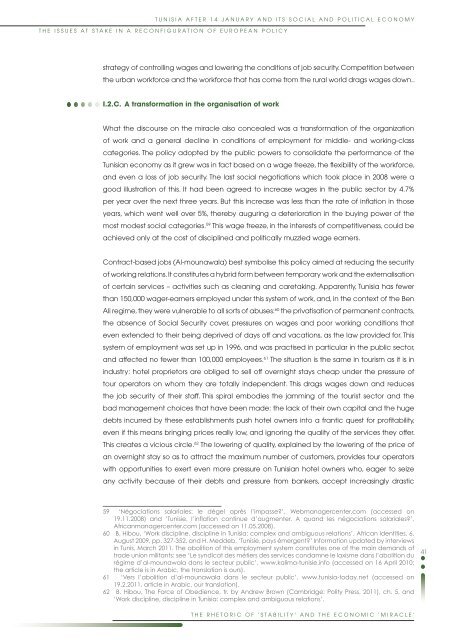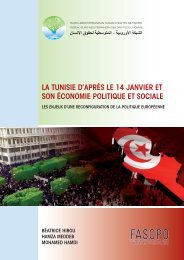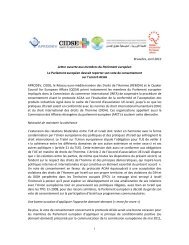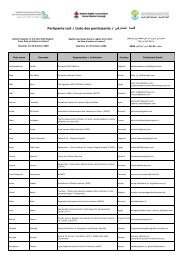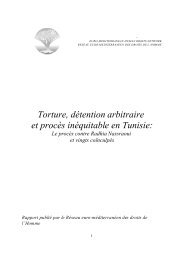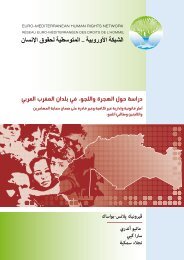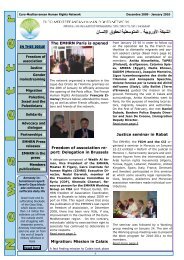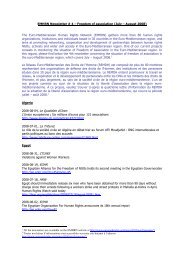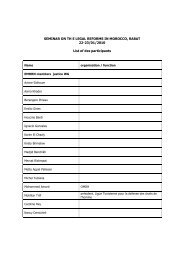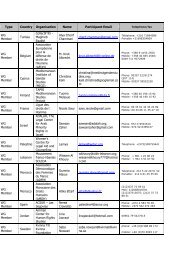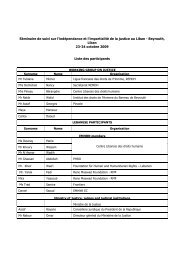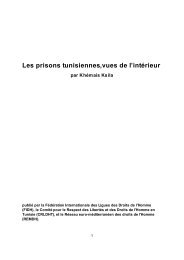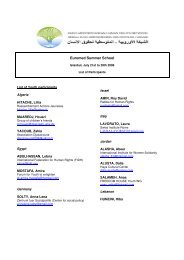tunisia after 14 january and its social and political economy - Refworld
tunisia after 14 january and its social and political economy - Refworld
tunisia after 14 january and its social and political economy - Refworld
You also want an ePaper? Increase the reach of your titles
YUMPU automatically turns print PDFs into web optimized ePapers that Google loves.
T U N I S I A A F T E R 1 4 J A N U A R Y A N D I T S S O C I A L A N D P O L I T I C A L E C O N O M YT H E I S S U E S A T S T A K E I N A R E C O N F I G U R A T I O N O F E U R O P E A N P O L I C Ystrategy of controlling wages <strong>and</strong> lowering the conditions of job security. Competition betweenthe urban workforce <strong>and</strong> the workforce that has come from the rural world drags wages down..I.2.C. A transformation in the organisation of workWhat the discourse on the miracle also concealed was a transformation of the organizationof work <strong>and</strong> a general decline in conditions of employment for middle- <strong>and</strong> working-classcategories. The policy adopted by the public powers to consolidate the performance of theTunisian <strong>economy</strong> as it grew was in fact based on a wage freeze, the flexibility of the workforce,<strong>and</strong> even a loss of job security. The last <strong>social</strong> negotiations which took place in 2008 were agood illustration of this. It had been agreed to increase wages in the public sector by 4.7%per year over the next three years. But this increase was less than the rate of inflation in thoseyears, which went well over 5%, thereby auguring a deterioration in the buying power of themost modest <strong>social</strong> categories. 59 This wage freeze, in the interests of competitiveness, could beachieved only at the cost of disciplined <strong>and</strong> <strong>political</strong>ly muzzled wage earners.Contract-based jobs (Al-mounawala) best symbolise this policy aimed at reducing the securityof working relations. It constitutes a hybrid form between temporary work <strong>and</strong> the externalisationof certain services – activities such as cleaning <strong>and</strong> caretaking. Apparently, Tunisia has fewerthan 150,000 wager-earners employed under this system of work, <strong>and</strong>, in the context of the BenAli regime, they were vulnerable to all sorts of abuses: 60 the privatisation of permanent contracts,the absence of Social Security cover, pressures on wages <strong>and</strong> poor working conditions thateven extended to their being deprived of days off <strong>and</strong> vacations, as the law provided for. Thissystem of employment was set up in 1996, <strong>and</strong> was practised in particular in the public sector,<strong>and</strong> affected no fewer than 100,000 employees. 61 The situation is the same in tourism as it is inindustry: hotel proprietors are obliged to sell off overnight stays cheap under the pressure oftour operators on whom they are totally independent. This drags wages down <strong>and</strong> reducesthe job security of their staff. This spiral embodies the jamming of the tourist sector <strong>and</strong> thebad management choices that have been made: the lack of their own capital <strong>and</strong> the hugedebts incurred by these establishments push hotel owners into a frantic quest for profitability,even if this means bringing prices really low, <strong>and</strong> ignoring the quality of the services they offer.This creates a vicious circle. 62 The lowering of quality, explained by the lowering of the price ofan overnight stay so as to attract the maximum number of customers, provides tour operatorswith opportunities to exert even more pressure on Tunisian hotel owners who, eager to seizeany activity because of their debts <strong>and</strong> pressure from bankers, accept increasingly drastic59 ‘Négociations salariales: le dégel après l’impasse?’, Webmanagercenter.com (accessed on19.11.2008) <strong>and</strong> ‘Tunisie, l’inflation continue d’augmenter. A qu<strong>and</strong> les négociations salariales?’,Africanmanagercenter.com (accessed on 11.05.2008).60 B. Hibou, ‘Work discipline, discipline in Tunisia: complex <strong>and</strong> ambiguous relations’, African Identities, 6,August 2009, pp. 327-352, <strong>and</strong> H. Meddeb, ‘Tunisie, pays émergent?’ Information updated by interviewsin Tunis, March 2011. The abolition of this employment system constitutes one of the main dem<strong>and</strong>s oftrade union militants: see ‘Le syndicat des métiers des services condamne le laxisme dans l’abolition durégime d’al-mounawala dans le secteur public’, www.kalima-tunisie.info (accessed on 16 April 2010;the article is in Arabic, the translation is ours).61 ‘Vers l’abolition d’al-mounawala dans le secteur public’, www.<strong>tunisia</strong>-today.net (accessed on19.2.2011, article in Arabic, our translation).62 B. Hibou, The Force of Obedience, tr. by Andrew Brown (Cambridge: Polity Press, 2011), ch. 5, <strong>and</strong>‘Work discipline, discipline in Tunisia: complex <strong>and</strong> ambiguous relations’.41T h e r h e t o r i c o f ‘ s t a b i l i t y ’ a n d t h e e c o n o m i c ‘ m i r a c l e ’


